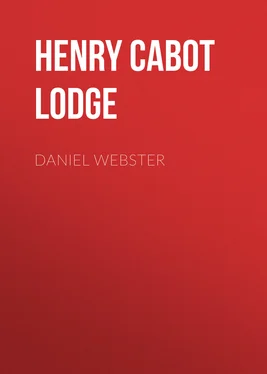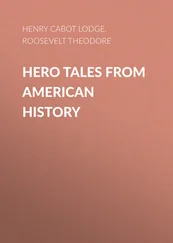Henry Cabot Lodge - Daniel Webster
Здесь есть возможность читать онлайн «Henry Cabot Lodge - Daniel Webster» — ознакомительный отрывок электронной книги совершенно бесплатно, а после прочтения отрывка купить полную версию. В некоторых случаях можно слушать аудио, скачать через торрент в формате fb2 и присутствует краткое содержание. Жанр: Биографии и Мемуары, История, foreign_edu, foreign_antique, foreign_prose, на английском языке. Описание произведения, (предисловие) а так же отзывы посетителей доступны на портале библиотеки ЛибКат.
- Название:Daniel Webster
- Автор:
- Жанр:
- Год:неизвестен
- ISBN:нет данных
- Рейтинг книги:5 / 5. Голосов: 1
-
Избранное:Добавить в избранное
- Отзывы:
-
Ваша оценка:
- 100
- 1
- 2
- 3
- 4
- 5
Daniel Webster: краткое содержание, описание и аннотация
Предлагаем к чтению аннотацию, описание, краткое содержание или предисловие (зависит от того, что написал сам автор книги «Daniel Webster»). Если вы не нашли необходимую информацию о книге — напишите в комментариях, мы постараемся отыскать её.
Daniel Webster — читать онлайн ознакомительный отрывок
Ниже представлен текст книги, разбитый по страницам. Система сохранения места последней прочитанной страницы, позволяет с удобством читать онлайн бесплатно книгу «Daniel Webster», без необходимости каждый раз заново искать на чём Вы остановились. Поставьте закладку, и сможете в любой момент перейти на страницу, на которой закончили чтение.
Интервал:
Закладка:
Mr. Webster came forward gradually as a political leader by occasional addresses and speeches, at first with long intervals between them, and then becoming more frequent, until at last he found himself fairly engaged in a public career. In 1804, at the request of some of his father's friends, he published a pamphlet, entitled, "An Appeal to Old Whigs," in the interest of Gilman, the Federal candidate for governor. He seems to have had a very poor opinion of this performance, and his interest in the success of the party at that juncture was very slight. In 1805 he delivered a Fourth of July oration at Salisbury, which has not been preserved; and in the following year he gave another before the "Federal gentlemen" of Concord, which was published. The tone of this speech is not very partisan, nor does it exhibit the bitter spirit of the Federalists, although he attacked the administration, was violent in urging the protection of commerce, and was extremely savage in his remarks about France. At times the style is forcible, and even rich, but, as a rule, it is still strained and artificial. The oration begins eagerly with an appeal for the Constitution and the Republic, the ideas always uppermost in Mr. Webster's mind. As a whole, it shows a distinct improvement in form, but there are no marks of genius to raise it above the ordinary level of Fourth of July speeches. His next production was a little pamphlet, published in 1808, on the embargo, which was then paralyzing New England, and crushing out her prosperity. This essay is important because it is the first clear instance of that wonderful faculty which Mr. Webster had of seizing on the vital point of a subject, and bringing it out in such a way that everybody could see and understand it. In this case the point was the distinction between a temporary embargo and one of unlimited duration. Mr. Webster contended that the latter was unconstitutional. The great mischief of the embargo was in Jefferson's concealed intention that it should be unlimited in point of time, a piece of recklessness and deceit never fully appreciated until it had all passed into history. This Mr. Webster detected and brought out as the most illegal and dangerous feature of the measure, while he also discussed the general policy in its fullest extent. In 1809 he spoke before the Phi Beta Kappa Society, upon "The State of our Literature," an address without especial interest except as showing a very marked improvement in style, due, no doubt, to the influence of Mr. Mason.
During the next three years Mr. Webster was completely absorbed in the practice of his profession, and not until the declaration of war with England had stirred and agitated the whole country did he again come before the public. The occasion of his reappearance was the Fourth of July celebration in 1812, when he addressed the Washington Benevolent Society at Portsmouth. The speech was a strong, calm statement of the grounds of opposition to the war. He showed that "maritime defence, commercial regulations, and national revenue" were the very corner-stones of the Constitution, and that these great interests had been crippled and abused by the departure from Washington's policy. He developed, with great force, the principal and the most unanswerable argument of his party, that the navy had been neglected and decried because it was a Federalist scheme, when a navy was what we wanted above all things, and especially when we were drifting into a maritime conflict. He argued strongly in favor of a naval war, and measures of naval defence, instead of wasting our resources by an invasion of Canada. So far he went strictly with his party, merely invigorating and enforcing their well-known principles. But when he came to defining the proper limits of opposition to the war he modified very essentially the course prescribed by advanced Federalist opinions. The majority of that party in New England were prepared to go to the very edge of the narrow legal line which divides constitutional opposition from treasonable resistance. They were violent, bitter, and uncompromising in their language and purposes. From this Mr. Webster was saved by his breadth of view, his clear perceptions, and his intense national feeling. He says on this point:—
"With respect to the war in which we are now involved, the course which our principles require us to pursue cannot be doubtful. It is now the law of the land, and as such we are bound to regard it. Resistance and insurrection form no part of our creed. The disciples of Washington are neither tyrants in power nor rebels out. If we are taxed to carry on this war we shall disregard certain distinguished examples and shall pay. If our personal services are required we shall yield them to the precise extent of our constitutional liability. At the same time the world may be assured that we know our rights and shall exercise them. We shall express our opinions on this, as on every measure of the government,—I trust without passion, I am certain without fear. By the exercise of our constitutional right of suffrage, by the peaceable remedy of election, we shall seek to restore wisdom to our councils, and peace to our country."
This was a sensible and patriotic opposition. It represented the views of the moderate Federalists, and traced the lines which Mr. Webster consistently followed during the first years of his public life. The address concluded by pointing out the French trickery which had provoked the war, and by denouncing an alliance with French despotism and ambition.
This oration was printed, and ran at once through two editions. It led to the selection of Mr. Webster as a delegate to an assembly of the people of the county of Rockingham, a sort of mass convention, held in August, 1812. There he was placed on the committee to prepare the address, and was chosen to write their report, which was adopted and published. This important document, widely known at the time as the "Rockingham Memorial," was a careful argument against the war, and a vigorous and able presentation of the Federalist views. It was addressed to the President, whom it treated with respectful severity. With much skill it turned Mr. Madison's own arguments against himself, and appealed to public opinion by its clear and convincing reasoning. In one point the memorial differed curiously from the oration of a month before. The latter pointed to the suffrage as the mode of redress; the former distinctly hinted at and almost threatened secession even while it deplored a dissolution of the Union as a possible result of the administration's policy. In the one case Mr. Webster was expressing his own views, in the other he was giving utterance to the opinions of the members of his party among whom he stood. This little incident shows the susceptibility to outside influences which formed such an odd trait in the character of a man so imperious by nature. When acting alone, he spoke his own opinions. When in a situation where public opinion was concentrated against him, he submitted to modifications of his views with a curious and indolent indifference.
The immediate result to Mr. Webster of the ability and tact which he displayed at the Rockingham Convention was his election to the thirteenth Congress, where he took his seat in May, 1813. There were then many able men in the House. Mr. Clay was Speaker, and on the floor were John C. Calhoun, Langdon Cheves and William Lowndes of South Carolina, Forsyth and Troup of Georgia, Ingersoll of Pennsylvania, Grundy of Tennessee, and McLean of Ohio, all conspicuous in the young nationalist war party. Macon and Eppes were representatives of the old Jeffersonian Republicans, while the Federalists were strong in the possession of such leaders as Pickering of Massachusetts, Pitkin of Connecticut, Grosvenor and Benson of New York, Hanson of Maryland, and William Gaston of North Carolina. It was a House in which any one might have been glad to win distinction. That Mr. Webster was considered, at the outset, to be a man of great promise is shown by the fact that he was placed on the Committee on Foreign Relations, of which Mr. Calhoun was the head, and which, in the war time, was the most important committee of the House.
Читать дальшеИнтервал:
Закладка:
Похожие книги на «Daniel Webster»
Представляем Вашему вниманию похожие книги на «Daniel Webster» списком для выбора. Мы отобрали схожую по названию и смыслу литературу в надежде предоставить читателям больше вариантов отыскать новые, интересные, ещё непрочитанные произведения.
Обсуждение, отзывы о книге «Daniel Webster» и просто собственные мнения читателей. Оставьте ваши комментарии, напишите, что Вы думаете о произведении, его смысле или главных героях. Укажите что конкретно понравилось, а что нет, и почему Вы так считаете.












